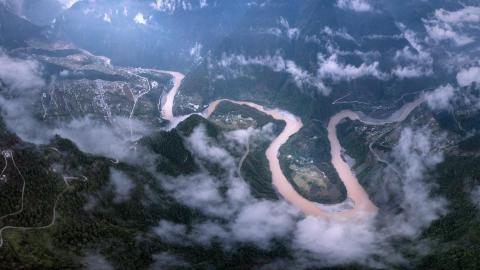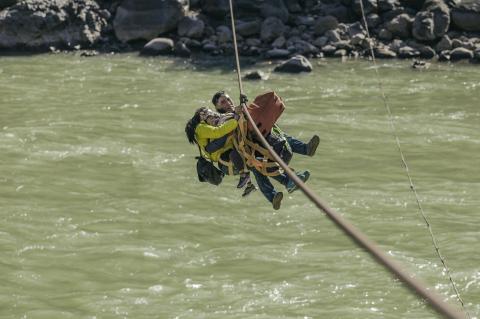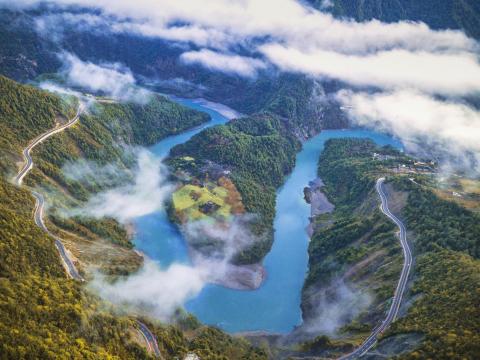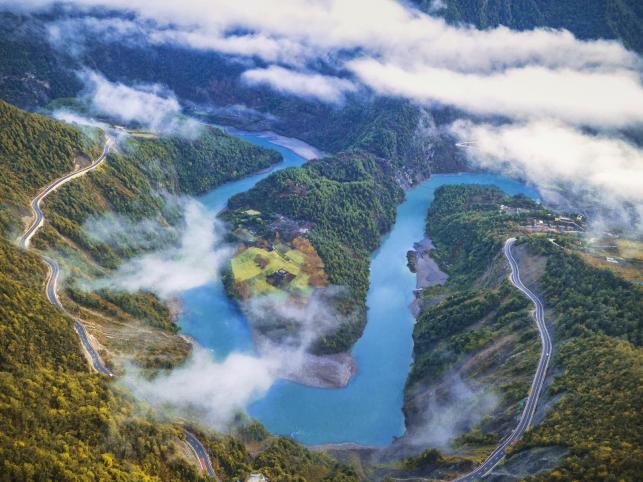A thousand years in one step: the local direct-transition ethnic groups of Nujiang River
Nujiang River Gorge near the China-Myanmar border is a hidden gem in Yunnan. Made up of a series of awesome mountains ranges, it is nicknamed ‘wrinkles of the earth,’ created by a clash of tectonic plates.
Down the gorge lies the famous Nujiang River. It originates from the Tibetan Plateau and runs through Yunnan into the Indian Ocean, stretching over 3000 kilometres. Stretching 650 kilometres through Yunnan province and 316 kilometers through Nujiang Lisu Autonomous Prefecture, the Canyon is the second largest in the world after the Grand Canyon of Colorado.

It is a remote place with high mountains and deep valleys and has been isolated from the world for a long time. If it was not for UNESCO's declaration in 2002 that the three Parallel Rivers in northwest Yunnan, were a World Natural Heritage site, many people may never have known about their existence!
The water here flows rapidly because of the huge drop in the gorge’s height. The water volume is around 1.6 times that of the Yellow River. The river water surges day and night, shaping the steep cliffs that make up the spectacular scenery.
On the banks, at over 3000 metres, you will find the Gaoligong Mountains and Biluo Snow Mountains.
In the Nujiang area, there are many direct-transition ethnic groups, some of whom were still living a life consigned of bygone days. Since the founding of the PRC (People’s Republic of China), they leapt forward a thousand years overnight. Instead of a gradual modernisation, they leapfrogged from a primitive society into a modern one.
Without proper or paved roads, it had always been a dangerous adventure going up and down the mountains. A zip Line needed to be used by people living in the depths of the mountains to get around They could only transport materials and agricultural products by this method.
Life was very challenging and transportation costs high, trapping them in a cycle of poverty for a long time.
Even under specific geographical and historical conditions, the zip line has played a vital role as a link between local residents and the outside world.

The difficulties of crossing the river lasted more than a century for the villagers. In 2016, the Yunnan Provincial Government launched a project to replace all the zip lines in the province with bridges.
Spending over two billion yuan, 199 bridges and many more connecting roads were built over the next few years. Since then, no one needed to risk their life over the river anymore. All the zip lines were consigned to the history books.
Because of the convenient transportation created through the whole Nujiang River Gorge, and because of local government support, farmers have been gradually lifted out of poverty.
More and more visitors can now visit this last piece of hidden land, uncovering the mysterious beauty of the gorge.

Since 2016, the country has invested 950 billion yuan in transportation networks, covering impoverished regions all over the country. More than 50,000 poverty-sticken villages have benefitted, with roads leading right up to them.
Many school-age children did not take part in compulsory education due to the terrible traffic . When asked when they were born, they only knew it was when it rained, and some could only speak dialects.
Under the targeted poverty alleviation plan, making sure every child receives an education is the priority.
In order to better help the Nujiang direct-transition ethnic groups build a better future, the local government opened up schools, to get young people learning.
The teachers knocked on every door in every mountain village to encourage parents to send their children to school, to open their eyes to the wider world through books.
But for these children, school is challenging. The students must learn to adapt to a new world.
That learning goes right back to basics, including things like drinking boiled water, brushing their teeth, taking a bath and personal etiquette.
To help the children onto the right path, schools have set up general vocational education integrated classes, focusing on vocational pre-placement. They can learn to repair cars, cook, do hairdressing, tea art as well as artificial intelligence programming.
In the World Robot Contest 2020, the representative team ‘A thousand years in one step’won a Second Class Award for robot-making.
The education is life-changing, not only helping the young people of today, but also future generations.This has been at the heart of publicity campaigns to help villagers understand the importance of a good education.
The number of uneducated has fallen dramatically from the hundreds of thousands to only 1000 who were not receiving lessons a few years ago.
After they graduate, children also receive free vocational training to pick up specialised skills as well. Helping to set them on a trail of success.
The direct-transition ethnic groups in Nujiang's have also successfully transitioned from their previous poverty. As you travel to the Nujiang River, you can have a look at their new home and living conditions.







